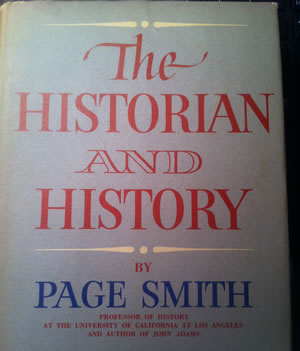Whenever I come across a book where a seasoned historian talks about the historical profession, I snatch it up. This past weekend, I came across Page Smith’s The Historian and History (1964). Smith is no longer with us and this writing speaks to us from the post-World War II era before the Vietnam War soured American’s interest in military history.

Smith believed that historians no longer considered their profession a science, but still treated it as such. He clearly placed a higher value on telling stories than finding a niche and analyzing it to death, or as he described it, “more and more research into less and less.” Instead, he saw narrative history as “great history, the history that has commanded men’s minds and hearts.” This sort of history “lifts the spirits and projects new potentialities.” ((Page Smith, The Historian and History (New York: Alfred A. Knopf, 1964), 142.))
Conversely, he was not impressed with the niche history that was dominating his time and frankly, dominates our current day, “The detailed, analytical history that is the standard product of our academies has little to say to the ordinary man.” I find this particularly important, because when I share history with friends and coworkers, they are all ordinary people. None of them is a professional historian. Smith continued, “Indeed, [detailed, analytical history] often seems to have only contempt and scorn for [ordinary man].” ((Ibid.)) I would add that this sort of history and those who prefer it often have contempt and scorn for historians who do not follow suit.
We obviously need both approaches. Without detailed analysis, we will remain at a superficial level that many could not accept. Historians will also lack confidence in their narratives without the detailed research to back it up. However, the detailed, analytical history is more for historians, not ordinary man. Without an interesting narrative—and I say “interesting” with the belief that all history is fascinating with the right storyteller—the average person will find little interest. We historians need to be mindful of our audience and deliver accordingly.
